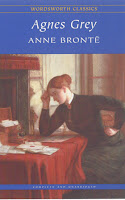8.20.2012
Agnes Grey
Historically, Anne Bronte has been much overlooked and overshadowed by the incredible brilliance of her illustrious sisters. However, I categorize her on the same level as Charlotte and Emily namely because of her wonderfully vivid style of writing. A defining characteristic of the Bronte sisters is the way they wrote about things they knew a little of and laced them with ideas and situations they could only imagine. Agnes Grey is a bit of a mold-breaker in that it's based mostly on Anne's personal experiences as a governess.
Being a governess wasn't an incredibly desirable job, yet many novels sort of gloss over the trials they encountered; not so with Agnes Grey. Often throughout the novel it seems like Anne penned the real-life frustrations she encountered as a governess and then later changed the names for the sake of her story.
At the start of the novel, Agnes is a little difficult to sympathize with because of the reserved way she relates her story. As with so many novels, the heroine doesn't open up and become more three-dimensional until the love interest comes on the scene. Agnes and her unspoken love of Edward Weston brings bittersweetness into the novel, and that trial gives the story its beauty. It's an understated short novel, and it's well worth a read.
Here's a poem Anne wrote shortly after Emily's death and aptly named by Charlotte:
Last Lines by Anne Bronte-
I hoped, that with the brave and strong,
My portioned task might lie;
To toil amid the busy throng,
With purpose pure and high.
But God has fixed another part,
And He has fixed it well;
I said so with my bleeding heart,
When first the anguish fell.
A dreadful darkness closes in
On my bewildered mind;
Oh, let me suffer and not sin,
Be tortured, yet resigned.
Shall I with joy thy blessings share
And not endure their loss?
Or hope the martyr's crown to wear
And cast away the cross?
Thou, God, hast taken our delight,
Our treasured hope away;
Thou bidst us now weep through the night
And sorrow through the day.
These weary hours will not be lost,
These days of misery,
These nights of darkness, anguish-tost,
Can I but turn to Thee.
Weak and weary though I lie,
Crushed with sorrow, worn with pain,
I may lift to Heaven mine eye,
And strive to labour not in vain;
That inward strife against the sins
That ever wait on suffering
To strike whatever first begins:
Each ill that would corruption bring;
That secret labour to sustain
With humble patience every blow;
To gather fortitude from pain,
And hope and holiness from woe.
Thus let me serve Thee from my heart,
Whate'er may be my written fate:
Whether thus early to depart,
Or yet a while to wait.
If thou shouldst bring me back to life,
More humbled I should be;
More wise, more strengthened for the strife,
More apt to lean on Thee.
Should death be standing at the gate,
Thus should I keep my vow;
But, Lord! whatever be my fate,
Oh, let me serve Thee now!
Subscribe to:
Post Comments (Atom)




 }
}

No comments:
Post a Comment